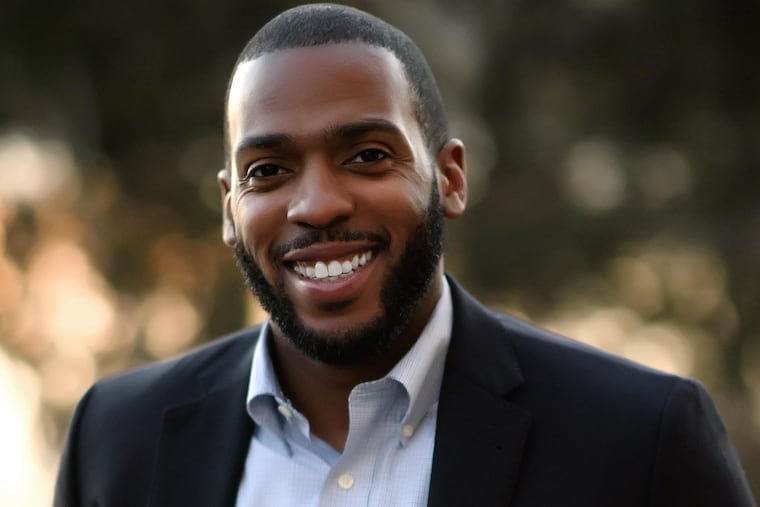New leader of Philly-based cannabis company Ethos is among the first Black CEOs in big weed
“It’s giving me the opportunity to create and change the narrative around this plant, my culture, and maybe some of the story that has been told over the last hundred years,” Gibran Washington said.

A Philly guy by way of Florida is stepping up to lead a local large player in cannabis, as the industry works to make its ownership and executive leadership more diverse.
Gibran Washington, 39, has been named the new CEO of Ethos, a vertically integrated, multistate operator headquartered in Philadelphia, the company announced this week. Founded in 2019, Ethos operates 13 dispensaries across Pennsylvania, Ohio, and Massachusetts, including two in Philadelphia. It also operates three large cultivation facilities, with its Pennsylvania growing outpost sitting in the former U.S. Steel’s Fairless Works in Fairless Hills, Bucks County.
The promotion makes Washington among the first Black CEOs to lead a cannabis company of that scale. He said his appointment comes at “the right time,” as in recent years marijuana legalization has seen an increased focus on social justice related to the impacts of the war on drugs, which has disproportionately impacted Black communities.
“Being an African American is a huge responsibility to be in this industry,” Washington said. “We understand how this issue was used to disenfranchise us for so long, to vilify us, and put us in these boxes where we were lesser than.”
Still, the legal and medical marijuana industries remain dominated by white executives and owners. According to a 2021 Business Insider analysis, white men make up 70% of C-suite positions at the 14 largest publicly traded marijuana companies, with just 7% of executives surveyed identifying as Black. And according to a 2017 Marijuana Business Daily study, vertically integrated cannabis companies — ones that cultivate, process, and sell their own marijuana — like Ethos have about 12.3% of executive positions filled by individuals who identified as being from a nonwhite demographic.
Ownership of cannabis companies is even lower, with less than 2% of the 30,000 marijuana businesses nationwide having Black owners, according to a 2021 survey from Leafly.
As a result of those trends, Washington called his role as CEO of Ethos a heavy responsibility. But it also presents possibilities.
“It’s giving me the opportunity to create and change the narrative around this plant, my culture, and maybe some of the story that has been told over the last hundred years,” Washington said.
As with many marijuana industry leaders, Washington’s path to big weed was somewhat nontraditional. Raised in Jacksonville, Fla., by a family who hails from Germantown, where he spent summers and holidays as a kid, Washington spent more than a decade as an executive in the restaurant and hospitality industry before joining Ethos as vice president of retail, wholesale, and supply chain operations in September 2022. A year later, he was named CEO.
In many ways, that quick upward trajectory, Washington said, was a result of his longtime understanding of cannabis from the legacy side of the market. As a teenager, his parents had a more permissive attitude about marijuana than alcohol, and his late father, a former vice president of organization at Blue Cross Blue Shield, used cannabis to manage symptoms during a bout with cancer in the early 2000s.
“I always had that experience that an executive of a large national company could be in a boardroom and also use cannabis at the same time,” Washington said. “That made me look at cannabis a little different.”
So did his late brother, who “lost his life in the arena of cannabis,” as Washington put it. Washington’s brother, Garrett, was deeply involved in the legacy market, and was ultimately killed in a 2008 North Carolina shooting in what police at the time said was an attempted robbery turned deadly. No charges were filed in relation to Garrett’s death, but the man who killed him pleaded guilty to federal drug charges.
Washington said he remembers his brother as a brilliant, kind man who didn’t reflect the negative stereotypes with which marijuana has historically been associated. And with marijuana now legal in many states, and Washington leading a large cannabis company, the societal changes around the drug are not lost on him.
“It is something that I will never forget — that I hold a position that my brother was killed for,” Washington said. “That is something that is very powerful to think about, day in, day out. I am doing something that 15 years ago cost him his life.”
Washington has big plans for Ethos. The company plans to reimagine and renovate its dispensaries, introduce new lines and forms of products such as edibles, and continue its research partnership with Thomas Jefferson University.
Announced in 2020, that partnership was the country’s first state-authorized medical marijuana research program. As The Inquirer previously reported, it is funded by Ethos to the tune of hundreds of thousands of dollars a year, and has conducted a number of studies and surveys looking at medical marijuana’s impact on the quality of life of patients, their experiences with patient certifications, and other factors. Upcoming studies, Washington said, will look at cannabis’ impact on treatment of anxiety, insomnia, and pain.
The Jefferson partnership, Washington said, is something of a “passion project” for Ethos. The goal, he added, is to increase knowledge about marijuana and its uses in order to build “an appropriate place in society” for the drug.
As Washington put it, that undertaking has already begun at Ethos. He expects more progress in that mission.
“In 2024, we got next,” he said.